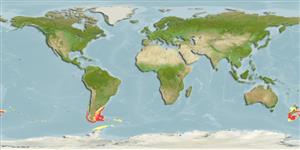>
Gadiformes (Cods) >
Gadidae (Cods and haddocks)
Etymology: Micromesistius: Greek, mikros = small + greek, mesos = middle + Greek, istion = sail (Ref. 45335).
More on author: Norman.
Environment: milieu / climate zone / depth range / distribution range
Sinh thái học
Biển Sống nổi và đáy; Ở đại duơng, biển (Ref. 51243); Mức độ sâu 50 - 900 m (Ref. 27363), usually 200 - 400 m (Ref. 7061). Temperate; 37°S - 65°S, 165°E - 34°W (Ref. 54589)
There are 2 disjunct populations. Micromesistius australis australis occurs around the Falkland Islands and Argentine Patagonia in the southwest Atlantic; off Chile in the southeast Pacific; also off South Georgia, South Shetland and South Orkney islands. Micromesistius australis pallidus occurs around the South Island of New Zealand.
Length at first maturity / Bộ gần gũi / Khối lượng (Trọng lượng) / Age
Maturity: Lm 33.7, range 33 - 40 cm
Max length : 90.0 cm TL con đực/không giới tính; (Ref. 1371); common length : 60.0 cm TL con đực/không giới tính; (Ref. 1371); Khối lượng cực đại được công bố: 850.00 g (Ref. 4883); Tuổi cực đại được báo cáo: 30 các năm (Ref. 7059)
Các tia vây lưng cứng (tổng cộng) : 0; Các vây lưng mềm (tổng cộng) : 43 - 55; Tia cứng vây hậu môn: 0; Tia mềm vây hậu môn: 56 - 71; Động vật có xương sống: 54 - 57.
Invades shelf waters during summer and concentrating over the continental slope in winter. Forms schools (Ref. 9072). The young feed on euphausiids and amphipods and occasionally on copepods, cephalopods and small fish. Utilized in frozen blocks and as fishmeal. In Japan used as suerii (minced meat) for karaoke (fish cake) (Ref. 27363). Can be fried, microwaved and baked (Ref. 9988).
Oviparous, sexes are separate (Ref. 205).
Cohen, D.M., T. Inada, T. Iwamoto and N. Scialabba, 1990. FAO species catalogue. Vol. 10. Gadiform fishes of the world (Order Gadiformes). An annotated and illustrated catalogue of cods, hakes, grenadiers and other gadiform fishes known to date. FAO Fish. Synop. 125(10). Rome: FAO. 442 p. (Ref. 1371)
IUCN Red List Status (Ref. 130435)
Threat to humans
Harmless
Human uses
Các nghề cá: tính thương mại cao
Các công cụ
Special reports
Download XML
Các nguồn internet
Estimates based on models
Preferred temperature (Ref.
123201): 3.4 - 9.1, mean 5.8 °C (based on 109 cells).
Phylogenetic diversity index (Ref.
82804): PD
50 = 0.7500 [Uniqueness, from 0.5 = low to 2.0 = high].
Bayesian length-weight: a=0.00372 (0.00223 - 0.00619), b=3.14 (2.99 - 3.29), in cm total length, based on LWR estimates for this species & (Sub)family-body (Ref.
93245).
Mức dinh dưỡng (Ref.
69278): 3.8 ±0.50 se; based on food items.
Thích nghi nhanh (Ref.
120179): Trung bình, thời gian nhân đôi của chủng quần tối thiểu là 1.4 - 4.4 năm (K=0.18; tm=2-5; tmax=30).
Prior r = 0.54, 95% CL = 0.36 - 0.82, Based on 5 data-limited stock assessments.
Fishing Vulnerability (Ref.
59153): Moderate to high vulnerability (52 of 100).
Climate Vulnerability (Ref.
125649): Moderate to high vulnerability (53 of 100).
Nutrients (Ref.
124155): Calcium = 38.2 [10.7, 99.6] mg/100g; Iron = 0.368 [0.123, 1.121] mg/100g; Protein = 16.3 [14.4, 18.6] %; Omega3 = 0.381 [0.149, 0.940] g/100g; Selenium = 12.1 [3.0, 42.1] μg/100g; VitaminA = 9.29 [1.98, 46.46] μg/100g; Zinc = 0.673 [0.286, 1.563] mg/100g (wet weight); based on
nutrient studies.
